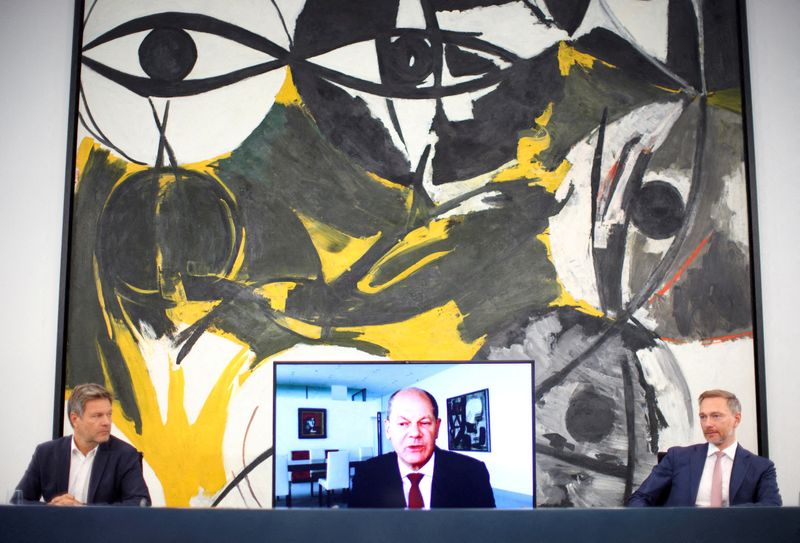
© Reuters. FILE PHOTO: German Chancellor Olaf Scholz (on screen), Economics Minister Robert Habeck and Finance Minister Christian Lindner attend a news conference about how to handle high gas prices, at the Chancellery in Berlin, September 29, 2022. REUTERS/Lisi Nie
By Rachel More and Paul Carrel
BERLIN (Reuters) -Germany can weather a winter gas shortage caused by Russia’s war on Ukraine provided companies and households pull together, the German chancellor said on Tuesday ahead of a meeting of EU ministers divided over the best response to the energy crisis.
EU energy ministers will gather in Prague ahead of a meeting on Wednesday to seek progress on a price cap and other measures in response to the sharp reduction of Russian supplies that once provided Europe with about 40% of its gas needs.
Talks have failed to produce agreement on the proposed cap, with Germany, Europe’s largest economy, and other wealthier European Union states fearing it could make it harder to source supplies.
Germany’s planned heavy spending to shield its citizens from the full impact of rising energy prices has also caused unease among some countries in the 27-nation EU that say it is more than poorer members can afford.
Germany suggested EU states could use money from the 800 billion euro ($778 billion) “Next Generation” pandemic recovery fund to help tackle crises such as the energy crisis, a government spokesperson said on Tuesday.
Chancellor Olaf Scholz said the country could not expect energy deliveries from Russia for the foreseeable future but that the situation could be managed.
“If we all continue to adapt to the changed situation – the citizens, the companies and the politicians – then we will get safely through this winter,” Scholz told an engineering conference.
There have already been signs of demand picking up in Germany on cooler days despite the need to curb consumption.
FOUR-DAY WEEKS AND CANDLE LIGHT
Across Europe, analysts have put the gas shortfall at almost 15% of average demand in winter and said Germany needs to cut energy consumption by around a fifth, with worrying implications for Europe’s biggest economy whose industry has relied on abundant, affordable energy supplies.
The energy crisis has had knock-on effects across Europe as businesses have passed on extra costs and consumers have less to spend.
Industry forecaster S&P Global (NYSE:SPGI) Mobility said that, in a worst case scenario, Europe’s energy crisis could cut its car production by close to 40%, or more than 1 million vehicles, per quarter through the end of 2023. The auto industry is widely regarded as a gauge of economic health.
Rather than splashing out on new cars, market research released on Tuesday showed Britons are stocking up on electric blankets, candles and energy-efficient slow cookers to try cut fuel bills and prepare for any power outages.
And in Italy, Intesa Sanpaolo (OTC:ISNPY), the country’s biggest bank, is discussing with unions a four-day working week for its 74,000 local staff in part to curb energy use.
GERMAN GAS STORAGE NEARLY 95% FULL
Scholz said that Germany, which had relied more heavily than most European states on Russia gas and has been racing to find alternative sources, had almost hit a target of having its gas storage facilities 95% full before the onset of winter.
Other European countries once dependent on Russia gas, such as Italy, have also been replenishing storage and sourcing supplies from other countries including Algeria and Azerbaijan.
Italy could however face a gas shortfall in the winter of 2023-24 without a new regasification terminal that is planned in Tuscany, the CEO of energy major Eni Claudio Descalzi said on Tuesday.
Russia progressively reduced gas flows through Nord Stream and also via other routes after Western sanctions in response to the Ukraine war that began in February.
Gas via Nord Stream stopped completely in September and any hope of resuming shipments to Germany through that route was dashed last month by suspected sabotage.
President Vladimir Putin said on Tuesday that Russia was not working against anyone on energy markets, a week after Washington criticised a decision by producer group OPEC+, of which Russia is a member, to steeply cut oil production.
($1 = 1.0305 euros)
Source: Investing.com





























